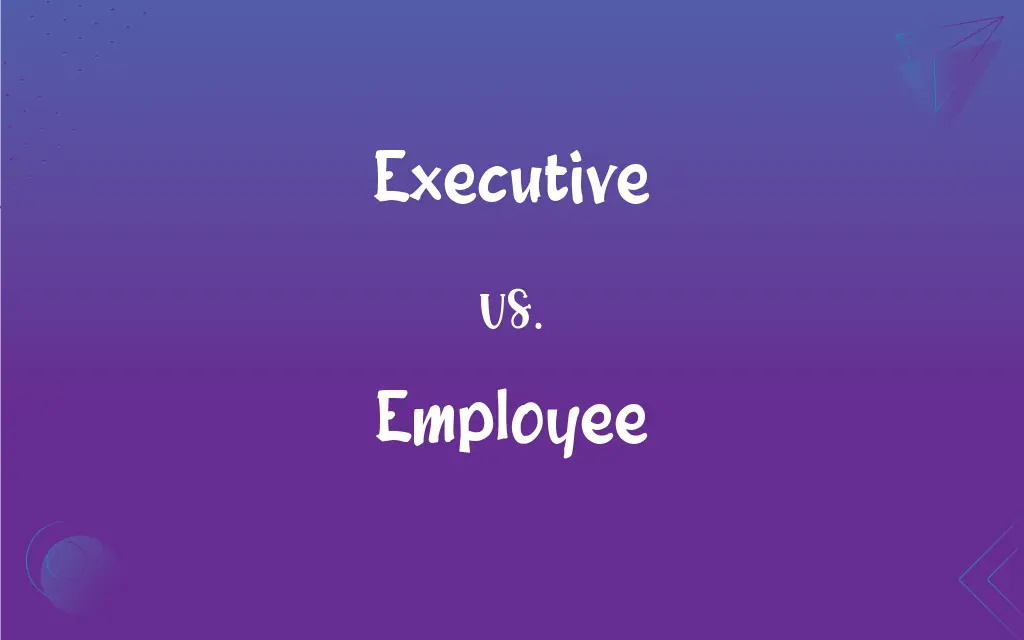Executive vs. Employee: What's the Difference?
Edited by Harlon Moss || By Janet White || Updated on September 21, 2023
An executive is a high-ranking individual who manages operations and makes organizational decisions, while an employee works under supervision to perform assigned tasks.

Key Differences
An executive, in a corporate context, is generally a person who has the authority to make significant decisions within an organization. They usually have a higher level of responsibility compared to an employee and are often involved in the strategic planning and implementation of organizational goals. On the other hand, an employee is someone hired by an organization to perform specific tasks, typically receiving compensation in the form of salary or wages.
Executives are critical for the overall management and success of a company. They have the responsibility of leading the organization and making crucial decisions that can affect the company’s future. Conversely, employees are the backbone of the organization, working to ensure the smooth execution of day-to-day operations and implementing the strategies set forth by executives.
An executive's role is multidimensional, often involving tasks such as formulating policies, directing operations, and engaging in high-level negotiations. An employee's role is more focused and generally involves executing the tasks assigned by superiors, adhering to company policies and guidelines.
The relationship between an executive and an employee is usually hierarchical. The executive is in a leadership role, providing direction and overseeing the work of employees. Employees, meanwhile, work under the guidance and supervision of executives and are responsible for performing their assigned duties efficiently.
The compensation and benefits for an executive are generally higher than those of an employee, reflecting the difference in responsibilities and accountabilities. While employees receive a salary and may receive additional benefits, executives often receive higher salaries, bonuses, and stock options due to their critical role in the company's success.
ADVERTISEMENT
Comparison Chart
Role
Makes organizational decisions.
Performs assigned tasks.
Level of Control
High-level control and responsibility.
Works under supervision.
Compensation
Higher salary, bonuses, stock options.
Regular salary, may have benefits.
Scope of Work
Multidimensional, strategic planning.
Focused on specific tasks.
Position in Hierarchy
In leadership and managerial roles.
Works under superiors.
ADVERTISEMENT
Executive and Employee Definitions
Executive
Executives are typically compensated with a higher salary, bonuses, and additional benefits due to their high level of responsibility.
The executive's compensation package included a significant amount of stock options.
Employee
An employee works under the supervision and guidance of superiors.
The employee reported the progress of his work to his manager every week.
Executive
An executive is a person who has leadership responsibilities in managing an organization or department.
The executive led the team to achieve unprecedented success this quarter.
Employee
Employees are responsible for executing day-to-day operations and adhering to company policies.
The employee followed company guidelines while interacting with clients.
Executive
Executives are involved in the strategic planning and execution of organizational goals.
The executive formulated a new strategy to increase market share.
Employee
Employees are crucial for the functioning and success of an organization.
Every employee in the team contributed to the successful completion of the project.
Executive
An executive often oversees the work of employees and manages operations within their domain.
The executive regularly reviewed the progress of various projects within the company.
Employee
An employee is an individual hired by a company to perform specific tasks in exchange for compensation.
The employee completed the project well before the deadline.
Executive
An executive possesses the authority to make significant decisions within an organization.
The executive decided to allocate more resources to research and development.
Employee
An employee receives compensation in the form of salary or wages and may receive additional benefits.
The employee appreciated the health benefits provided by the company.
Executive
A person or group having administrative or managerial authority in an organization.
Employee
A person who works for another in return for financial or other compensation.
Executive
The chief officer of a government, state, or political division.
Employee
An individual who provides labor to a company or another person.
One way to encourage your employees to work harder is by giving them incentives.
Executive
The branch of government charged with putting into effect a country's laws and the administering of its functions.
Employee
One employed by another.
Executive
(Computers) A set of coded instructions designed to process and control other coded instructions.
Employee
A worker who is hired to perform a job
Executive
Of, relating to, capable of, or suited for carrying out or executing
An advisory body lacking executive powers.
Executive
Having, characterized by, or relating to administrative or managerial authority
The executive director of a drama troupe.
Executive experience and skills.
Executive
Of or relating to the branch of government charged with the execution and administration of the nation's laws.
Executive
Designed or fitted for execution, or carrying into effect.
Executive
Of, pertaining to, or having responsibility for the day-to-day running of an organisation, business, country, etc.
Executive act
An executive officer
Executive government
Executive
Exclusive.
An executive bathroom
Executive
A chief officer or administrator, especially one who can make significant decisions on their own authority.
Executive
The branch of government that is responsible for enforcing laws and judicial decisions, and for the day-to-day administration of the state.
Executive
(computing) A process that coordinates and governs the action of other processes or threads; supervisor.
Executive
Designed or fitted for execution, or carrying into effect; as, executive talent; qualifying for, concerned with, or pertaining to, the execution of the laws or the conduct of affairs; as, executive power or authority; executive duties, officer, department, etc.
Executive
Of or pertaining to an executive{2} or to the group of executives within an organization; as, executive compensation increased more rapidly than wages in the 1980's; the executive suite.
Executive
An impersonal title of the chief magistrate or officer who administers the government, whether king, president, or governor; the governing person or body.
Executive
A person who has administrative authority over an organization or division of an organization; a manager, supervisor or administrator at a high level within an organization; as, all executives of the company were given stock options
Executive
A person responsible for the administration of a business
Executive
Persons who administer the law
Executive
Someone who manages a government agency or department
Executive
Having the function of carrying out plans or orders etc.;
The executive branch
FAQs
Do executives have higher compensation than employees?
Yes, executives generally have higher compensation, including salaries, bonuses, and stock options, compared to employees.
Are executives considered employees?
Yes, executives are considered a type of employee but with higher responsibilities and compensations.
What is the main responsibility of an executive?
An executive is responsible for making significant organizational decisions and managing operations.
Is the role of an executive focused or multidimensional?
The role of an executive is multidimensional, involving decision-making, planning, and managing.
Is an employee responsible for managing operations?
Typically, an employee is not responsible for managing operations but performs tasks assigned by superiors.
Can an executive perform tasks typically assigned to employees?
Yes, executives may perform such tasks, especially in smaller organizations, but their primary role is decision-making and management.
Is the scope of work for an employee multidimensional?
Typically, an employee's scope of work is more focused and related to specific tasks or projects.
Can an employee be involved in strategic planning?
Generally, employees execute tasks and may not be involved in strategic planning, which is usually an executive function.
Do employees have a role in a company’s success?
Absolutely, employees are vital as they execute the strategies and tasks that contribute to a company’s success.
Do employees make organizational decisions?
Employees usually do not make organizational decisions but may contribute insights and feedback.
Can executives set company policies?
Yes, executives often have the authority to formulate and set company policies.
Are executives critical for a company’s success?
Yes, executives play a crucial role in a company’s success through leadership and decision-making.
Are all employees involved in executing tasks?
Yes, all employees are hired to perform specific tasks or duties as assigned.
Do employees have the authority to change company policies?
No, employees do not have the authority to change company policies but may provide feedback.
Is an executive’s relationship with an employee hierarchical?
Yes, the relationship is generally hierarchical, with executives providing direction and employees executing tasks.
About Author
Written by
Janet WhiteJanet White has been an esteemed writer and blogger for Difference Wiki. Holding a Master's degree in Science and Medical Journalism from the prestigious Boston University, she has consistently demonstrated her expertise and passion for her field. When she's not immersed in her work, Janet relishes her time exercising, delving into a good book, and cherishing moments with friends and family.
Edited by
Harlon MossHarlon is a seasoned quality moderator and accomplished content writer for Difference Wiki. An alumnus of the prestigious University of California, he earned his degree in Computer Science. Leveraging his academic background, Harlon brings a meticulous and informed perspective to his work, ensuring content accuracy and excellence.







































































